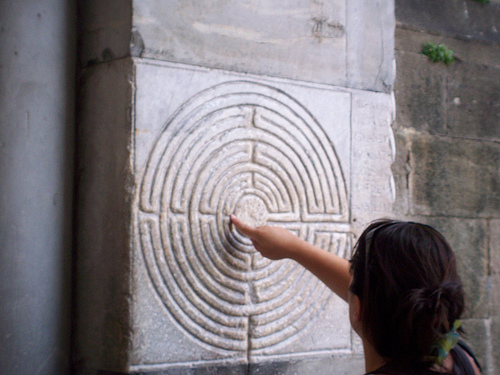We run our website the way we wished the whole internet worked: we provide high quality original content with no ads. We are funded solely by your direct support. Please consider supporting this project.

Problems with the Simple Foreknowledge View
Some have proposed a model of divine foreknowledge which allows them to avoid the dilemma of affirming either that God creates people for the purpose of sending them to hell (Calvinism) or that he creates them without certain knowledge of their fate (open theism). In this alternative view God knows that certain individuals will be damned but cannot on this basis refrain from creating them. This is called “simple foreknowledge,” for it holds that God simply knows what will take place but cannot alter it in the light of this knowledge. The fact that God foreknows what will occur does not increase his control over what occurs.
This view is somewhat different from the classical Arminian position, in which divine foreknowledge was understood to increase God’s control over what transpires without denying human freedom. The original disagreement between Arminius and Calvinistic contemporaries concerned whether God predestines the elect on the basis of his foreknowledge of their faith, as Arminius held, or foreknows the elect on the basis of his having predestined them. The Arminian position presupposes that God acts responsively to his foreknowledge. Thus, he foreknows who will believe and then predestines them.
The simple foreknowledge position denies that God can respond to his foreknowledge in this way, thus avoiding the problem of God creating individuals he knows will go to hell. In this view, God’s act of creating people is not affected by his knowledge of what will become of them. It is as though God possesses “insider information” but must buy and sell as thought he did not. For the same reason, this view does not require divine reason behind every event that occurs. God eternally foreknows each particular evil that will ever take place, but he can do nothing about it.
There are a few problems with this view. First, this and every other version of the Exhaustively Definite Foreknowledge doctrine cannot adequately account for the many passages of Scripture that depict God as facing a partly open future. Indeed, in one respect the simple foreknowledge perspective fares worse than classical Arminianism or Calvinism. Whenever Scripture emphasizes God’s foreknowledge of future events, it is to exalt his sovereign control over what is to come, which is exactly what the open view promotes.
Second, while the simple foreknowledge position avoids some difficulties by denying that God can alter his behavior in response to his knowledge of the future, it invites other difficulties. How can God respond to anything? With all Christians, defenders of simple foreknowledge want to affirm that God sometimes intervenes to bring about events that are more in line with his will. But if God can’t alter the future that he knows is coming, how can he respond to this same future when it becomes present? In the simple foreknowledge view, God must first experience events in the present as though he had no foreknowledge and then foreknow what he experienced and how he responded. In other words, his foreknowledge functions as a sort of “hindsight.”
One might be inclined to pity God if this is his predicament. From all eternity he has seen what is coming—the cosmic war, the horror, the pain, the suffering, the unending plight of the damned. And he can even foresee how he will respond to these tragedies once they occur. But he cannot do anything ahead of time to avoid them. He’s hopelessly locked into an unending vision he can do nothing about.
Third, this understanding of divine foreknowledge is irrelevant. In this view, God’s exhaustive foreknowledge doesn’t make any practical difference for God or for us concerning the flow of history. Everything proceeds as thought God did not possess Exhaustively Definite Foreknowledge. Indeed, if we hold to the pragmatic criterion of truth and insist that a belief must be able to make a conceivable difference in life to be meaningfully affirmed, then simple foreknowledge must be dismissed.
—Adapted from Satan and the Problem of Evil, pages 88-90
Image by berendbotje54 via Flickr
Category: General
Tags: Arminianism, Calvinism, Future, God, Open Theism, Satan and the Problem of Evil
Topics: Open Theism
Related Reading

What Makes the Good News So Good
While God was revealed in various ways and to various degrees through the law and the prophets of the Old Testament, in Jesus we finally have the one who is “the exact representation of God’s being” or essence (hypostasis, Heb. 1:1-13). This is the heart of the Good News that reverberates throughout the New Testament.…

8346
Umberto Salvagnin via Compfight Oh oh. It’s getting ugly up in here. Frank Viola is suggesting that Greg needs to fix a nice tall glass of shut-up juice. He and Greg have decided to have a debate on the open view sometime this fall, and they have been engaging in some smack talk since that decision…

What is the significance of 1 Samuel 23:9–13?
“David heard that Saul knew that he was hiding in Keliah. Saul was seeking to kill David, so David wisely consulted the Lord as to what he should do. David said, ‘O Lord, the God of Israel, your servant has heard that Saul seeks to come to Keliah, to destroy the city on my account.…

How do you respond to Acts 13:48?
“When the Gentiles heard this, they were glad and praised the word of the Lord; and as many as had been destined for eternal life became believers.” If the individual Gentiles who believed were “destined for eternal life” before they “became believers,” some may argue, they obviously were foreknown by God before they became believers.…

Podcast: Is it a Sin to Download Someone’s Consciousness?
Greg and Dan make a last ditch effort to save humanity from the rise of the robots. http://traffic.libsyn.com/askgregboyd/Episode_0327.mp3

Who Rules Governments? God or Satan? Part 2
In the previous post, I raised the question of how we reconcile the fact that the Bible depicts both God and Satan as the ruler of nations, and I discussed some classical ways this has been understood. In this post I want to offer a cross-centered approach to this classical conundrum that provides us with…
